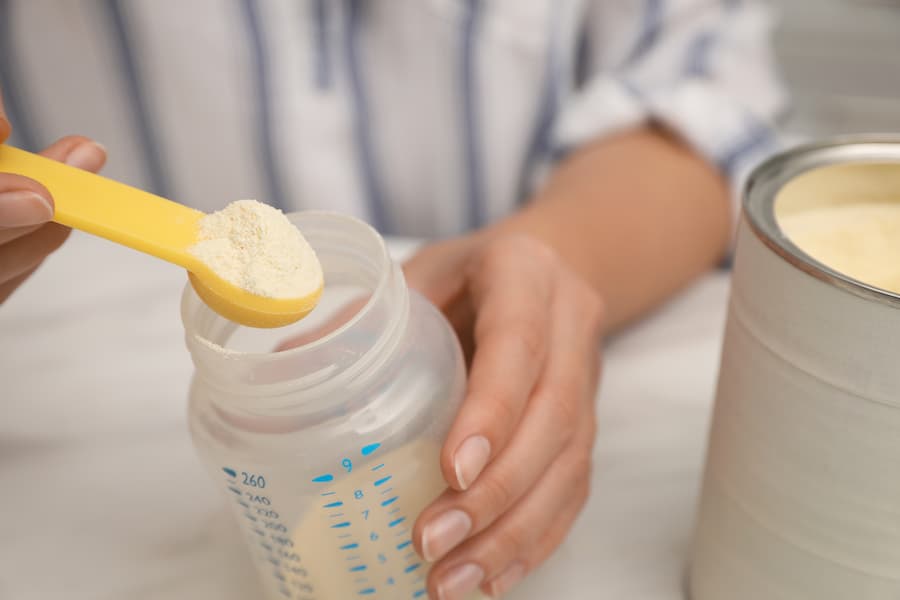Finding out that your child has a serious diagnosis can strike terror in the heart of any parent. Finding out that infant formula could have caused or contributed to the risk of that diagnosis can prove even more traumatic. Can Enfamil baby formula cause NEC? How does Enfamil consumption, or any cow milk-based formula consumption, increase an infant’s chance of developing NEC?

Understanding NEC in Infants
NEC causes tissue in the intestine to die off. An estimated 25 percent of infants diagnosed with NEC will die from the condition. In addition, some infants who develop NEC will need surgery to remove the damaged tissue and may end up with short bowel syndrome, making it more difficult for the body to absorb needed nutrients from food and cause lifelong digestive issues.
Symptoms of NEC may include:
- Bloody diarrhea
- Green or yellow vomit
- Refusal to eat
- Lack of weight gain or even weight loss
- Abdominal pain or swelling
- Changes in vital signs
When infants show signs of NEC, doctors may need to act fast to protect the infant’s overall health and quality of life. On average, it costs between $138,000 and $238,000 to treat a case of NEC in a premature infant—and that assumes that the infant will not have ongoing health challenges following that NEC diagnosis.
Can Enfamil Cause NEC?
A 2008 review notes that all newborn infants born before 37 weeks of pregnancy or who suffer from low birth weight due to outside reasons have an increased NEC risk. Using cow’s milk formula rather than an exclusive human milk diet leads to a 50 percent increased risk of NEC and a 90 percent greater risk of surgical NEC.
Preterm infants fed cow’s milk-based fortifier, rather than human milk alone, had a 4.2-fold increased risk of NEC and a 5.1-fold increased risk of surgical NEC or death, based on study results released in 2020.
As early as 2011, physicians across the United States knew that vulnerable premature infants suffered a higher risk of necrotizing enterocolitis due to formula feeding. Around this time, the Surgeon General issued a call to support breastfeeding. Furthermore, the American Academy of Pediatrics issued a statement to formula companies in 2012 stating that all preterm infants should receive human milk—not formula—if possible.
The AAP notes that premature infants, in particular, should receive their mother’s milk, whether fresh or frozen, as a primary source of nutrition during those vital early months. Furthermore, the AAP notes that pasteurized donor milk may serve as the second-best alternative.
While Enfamil does not directly cause NEC, it can serve as a significant contributing factor. Unfortunately, many parents feel heavily pressured into choosing formula for their infants. They may not understand the risks they agree to when they decide to use cow’s milk-based formula like Enfamil instead of turning to human milk for their baby’s needs.
Manufactured Need Created by Formula Manufacturers
In many cases, formula manufacturers like Mead Johnson, which makes Enfamil, and Abbott Laboratories, which manufactures Similac, utilize the opioid playbook to convince consumers that their products remain indispensable for the “good life.”
For example, they link their products to desirable outcomes: better overall health for mother and child. Both Similac and Enfamil include specific lines for “premature infants” that claim to offer better results for the most vulnerable infants, who may need additional nutritional support in those early months.
Parents feel pressured to choose formula or formula-fortified solutions rather than breast milk when the mother remains fully capable of providing the nutrition her child needs. In fact, marketing on Enfamil's website positions formula feeding as superior to breast milk for the child. As a result, parents may place their children in additional danger.
Formula manufacturers even send out free samples and discounts. Many new mothers have received "welcome packs" from Enfamil containing coupons and free samples for their baby's early days. As a result, mothers are likely to try the formula, which may result in supply issues and, ultimately, in an increased need for formula, all of it manufactured by the formula industry. In some cases, mothers may inadvertently sabotage their supplies due to worries based on information presented on those websites, which could lead to an increased need for formula and increased risk for the baby.
Inadequate Messaging and Warnings
Enfamil, despite the increased danger to infants, does not supply adequate warnings to help guide parents in making the ideal decision for their children. In fact, bottles and other prepackaged formula may contain a warning against microwaving, since it could scald the baby, but contain no warnings about the danger of developing NEC from feeding cow milk-based formula to a premature infant.
Enfamil, like other formula manufacturers, does not visibly try to stop mothers from breastfeeding. In fact, the website may contain more information about formula feeding than it does about breastfeeding. Despite claiming to provide parents with an “informed choice,” however, the website contains messaging focused on the challenges of breastfeeding, including difficulty maintaining supply.
As a result, many new mothers may feel less confident about breastfeeding and may turn to formula at the first potential sign of problems. As with that early welcome pack approach, simply introducing formula due to a lack of confidence can interfere with supply. Unfortunately, formula companies like Enfamil continue to prey on new mothers during that vulnerable time, increasing the odds that they will turn to formula or formula supplementation for their vulnerable little ones.
Was Your Child Diagnosed With NEC Due to Enfamil’s Negligent Practices?
If your infant received an NEC diagnosis due to feeding on Enfamil products, you may have grounds for a claim that can help your family recover the treatment funds you spent. Contact an experienced NEC attorney near you to learn more about your rights and how you can help protect your family.